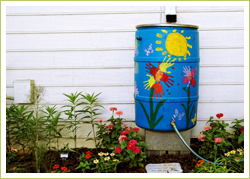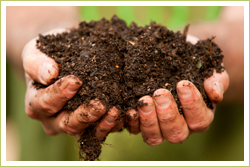5 Mistakes to avoid in gardens and landscapes
Joe Lamp’l Executive Producer and Host | Growing a Greener World

Gardeners are total optimists. Each new year brings hope for our best garden yet. Perhaps — but it’s not likely if we keep making the same mistakes. Getting our new plants and trees off to a good start and providing the right conditions for our existing ones certainly sets us up for success. And yet, doing the same things over and over while expecting different results — well, that’s another story.
I’ve spent a lot of time over the last several years contemplating what I think are the five biggest mistakes we make in our gardens and landscapes. We do so much to beautify our own little corner of the world, yet we’re doing a lot of not-so-pretty things in the process. Here’s my list:
Poor water management
All the water on this planet from day one is still here today. The problem is we have a lot more people using it, and the demand on this resource is increasing even faster. We can’t use up water, but we can deplete it from where it’s accessed. That’s why we need to conserve what we do use, so it’s there when we need it. Think of it as saving water for a sunny day!
The other area where we misuse water is in how we irrigate our lawns and gardens. Wetting foliage by watering overhead can cause plants to stay wet too long, which promotes plant diseases. And we don’t take enough time to amend soil so that it drains well. Plants and trees that sit in saturated soil rarely survive. More plants die from over-watering than under-watering. And that’s another good reason to minimize the use of it.
Failure to understand a plant’s cultural requirements
Plants growing in their ideal environment are naturally more vigorous and therefore more pest- and disease-resistant. Plus, when we don’t read or heed the information on those plant tags or seed packets, we make the mistake of planting that three-gallon holly against the foundation, only to cut it down a few years later when it overtakes the house. Put the right plant in the right place and you eliminate most of your maintenance problems, specifically the need to apply excess fertilizer or pesticides.
Failure to promote healthy soil
There is another world below the soil surface that we home gardeners know little about. Yet soil scientists tell us that in ideal conditions, it is teeming with billions of beneficial microorganisms that provide our plants with everything they need to grow and prosper, naturally. By improving the soil with a steady supply of organic matter, we promote plant growth by maintaining a healthy soil food web.
Excessive use of fertilizers
More is not better. Fertilizer that isn’t absorbed by the plant can leach into ground water or run off into watersheds, polluting water systems and harming amphibious habitats. Excess buildup in the soil can desiccate life underground, making plants chemically dependent for their nutrients and creating unsustainable soil for plants to thrive naturally. Using any chemicals with discretion and on target will go a long way to improving ecosystems everywhere.
Indiscriminate use of pesticides
Only about three percent of all insects are considered pests, so why do we carpet bomb with non-selective pesticides when 97 percent are either neutral or beneficial? If you want to have a bug problem, start spraying. Many insect pests have developed a resistance to insecticides, while beneficial insects are often the ones most adversely affected. In addition, according to the National Audubon Society, millions of backyard birds die each year as a result of consuming insects that have been killed by pesticides.
I have plenty more examples for the above five and rivals for other common mistakes. Now it’s your turn. What are some other big mistakes? I’d love to hear about them.